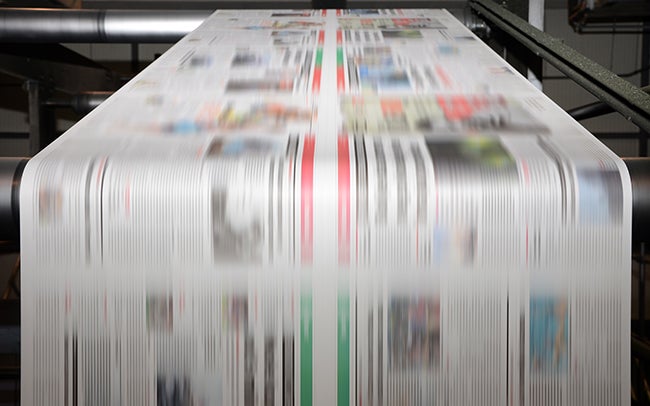Depending on whom you ask, Donald Trump is either a boon or a bane for the journalism industry. Although he has declared the media “the enemy of the people,” coverage of the president has also led to increased subscriptions and traffic to outlets like The Washington Post.
“There’s no question that we have experienced what some people call the ‘Trump bump,’” Post Executive Editor Marty Baron said at this year’s Washington Ideas Forum. Yet Baron is more concerned about the consequences of the president’s war against the media. Trump’s tweets have generated threats to the physical safety of journalists and had a corrosive effect on the institution of the press.
Media outlets like The Washington Post aren’t inherently in opposition to what they’re reporting on, they’re simply doing the job provided for in the First Amendment – holding government accountable. “We don’t view ourselves as part of the Resistance,” Baron said. He added that his publication has not rushed to call Trump a liar, as that would require proof that he knew what he was saying was false. Baron reported that Trump has even shared Post articles in the past. “Then in the next tweet he says we’re ‘fake news.’ There’s an internal inconsistency there.”
Despite the rhetoric, the media’s greatest challenge is not Donald Trump — it’s the disruption of the industry’s business model. Eighty-five cents of every ad dollar now goes to either Facebook or Google, forcing news outlets to rethink their revenue streams or face bankruptcy. This has been especially catastrophic for regional and local papers. While there is no shortage of outlets covering the White House, fewer journalists are being paid to report on the activities of city councils, school boards, and state governments.
Joanna Lipman, editor in chief of USA Today, shared these concerns at this year’s Ideas Festival. “At the local level, you still do see trust in the media because you have local reporters who are ingrained in their communities,” she said. Those reporters are perceived to share the thoughts, worries, and concerns of readers who feel neglected by larger outlets.
While the national press has historically had a low standing with the American public, confidence in the media has actually increased since Trump took office. David Leonhardt, op-ed columnist for The New York Times explained this phenomenon at a recent McCloskey Speaker Series event in Aspen. He pointed out that despite being labeled “fake,” today’s journalism is more accurate than it used to be. Writers, editors, and readers can hammer out questions in real time and keep one other accountable. What worries him is the Trump administration’s attempt to create a monopoly on information.
Trump is able to keep the national conversation focused on him because he’s a salesman, said Glenn Thrush, who joined the Forum on a panel following Baron’s conversation. The New York Times correspondent has known Trump since his days as a former tabloid reporter. “He sells himself. That’s his principal product,” Thrush said. Attacks on the press have become part of the Trump brand as he attempts to control the narrative.
While Trump’s personal battle against the media rages on, it is more critical than ever that citizens not only pay attention to the news, but also support those bringing these stories to light. Quality journalism requires time, effort, and paychecks. As Baron said, “We’re not at war. We’re at work.”


